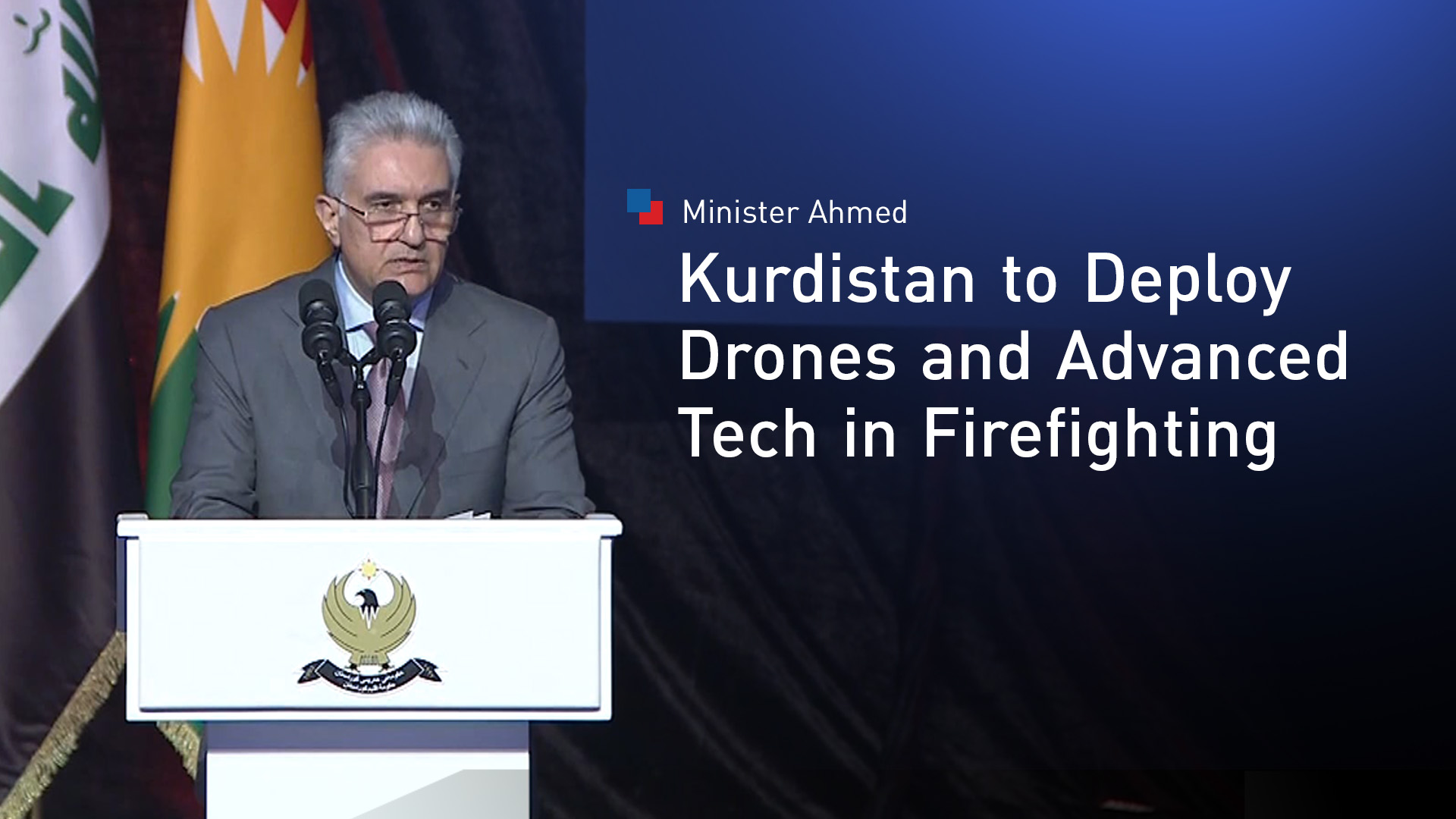A Blueprint for Safety: Kurdistan Region’s Interior Ministry Rolls Out Historic Reforms
KRG Interior Minister Rebar Ahmed announced major reforms in the ninth cabinet, including a new Safety Guide, the elevation of Civil Defense to a General Directorate, and modernized equipment, all aimed at enhancing public service and safety under PM Masrour Barzani's vision.

ERBIL (Kurdistan24) – In a comprehensive overview of a sweeping modernization and reform effort, Kurdistan Region's Minister of Interior, Rebar Ahmed, announced that the ninth cabinet of the Kurdistan Regional Government (KRG) has successfully implemented significant and foundational reforms across all of the ministry's institutions.
Speaking at a ceremony marking the official launch of the new Kurdistan Safety Guide, the minister detailed a multi-year strategic initiative, driven by the vision of Prime Minister Masrour Barzani, that has fundamentally reshaped the performance and capabilities of the region's security and civil service bodies, with the ultimate goal of better serving the people and elevating the quality of public services.
The minister’s address on Saturday celebrated the culmination of a dedicated, four-year process to establish the Kurdistan Region’s first-ever comprehensive safety guide and codes, a landmark achievement designed to ensure that the region’s infrastructure is built on a solid and secure foundation.
He revealed that the journey to this moment began on January 5, 2021, with a ministerial order to form a high committee tasked with the monumental undertaking of preparing and writing these new standards.
"Today, after four years, for the first time, the Kurdistan Region will have its own codes and standards in the field of safety," Ahmed stated, underscoring the historic nature of the accomplishment. He expressed his confidence that the full implementation of this new safety guide will be a critical factor in reducing the scope and impact of major disasters in the future, safeguarding both lives and property.
This meticulous focus on preventative measures and structural integrity is part of a broader, holistic strategy to professionalize and empower the region's civil defense capabilities.
Minister Ahmed explained that a cornerstone of this strategy was the strategic decision, made under the direct guidance and order of Prime Minister Masrour Barzani, to elevate the administrative level of the civil defense to a General Directorate and, crucially, to separate it from the police institution.
This structural reform grants the Civil Defense Directorate greater autonomy, a more focused mandate, and the institutional stature necessary to carry out its vital mission. It reflects a modern understanding of civil defense as a specialized and distinct field requiring its own command structure, resources, and strategic planning.
The minister detailed how this new institutional framework is being supported by tangible investments in both equipment and human capital.
"With the support of the Prime Minister, the best types of firefighting vehicles and equipment of large and small sizes are available to the civil defense teams," he announced. This commitment to providing modern, state-of-the-art tools is a direct investment in the safety of the public, ensuring that frontline responders are well-equipped to protect the citizens and institutions of Kurdistan from the consequences of natural disasters and other emergencies.
Parallel to this investment in hardware, an equally significant emphasis has been placed on professional development and training.
"We have given great importance to the subject of educating and training civil defense personnel," the minister stressed, highlighting the roles of the Civil Defense Institute and the Academy of Leadership and Management, both affiliated with the Ministry of Interior.
This dual focus on advanced equipment and highly skilled personnel is designed to ensure that the region's civil defense is in line with the principles of global best practices, empowered with both competence and cutting-edge technology.
The results of this comprehensive approach, he noted, are already evident. "The capability of Kurdistan's civil defense teams in various fire and flood incidents in Kurdistan is becoming stronger year after year," he said, adding that their professionalism in controlling incidents and saving lives has become a point of attention not only for the citizens of the Kurdistan Region but also for those in other Iraqi cities.
Looking to the future, Minister Ahmed revealed that this process of modernization is set to continue with the integration of advanced technology.
"In the near future, we will see that advanced technology and drones will come into use in firefighting in Kurdistan," he announced, signaling a forward-thinking approach that embraces innovation to further enhance the directorate's effectiveness.
The reforms within the Civil Defense Directorate, while significant, are just one component of a much wider transformation across the entire Ministry of Interior.
The minister reported that "good progress has been seen" in a broad range of the ministry's core functions. This includes crucial advancements in the work and duties of the police, the traffic directorates, the directorates for combating violence against women, and the agencies responsible for confronting crises, managing migration and displaced persons camps, and all other internal security forces.
This comprehensive progress, he explained, is the direct result of a concerted effort to align the performance of every institution within the ministry with the overarching agenda of the ninth cabinet and the Prime Minister's vision for a more efficient and citizen-centric government.
Minister Ahmed also articulated the philosophical underpinnings of the newly empowered Civil Defense General Directorate, explaining that its duties are built upon four main principles: disaster prevention, preparedness for response, responding effectively to disasters and crises, and fostering coordination and cooperation with the public for recovery and revival.
This strategic framework demonstrates a shift from a purely reactive model to a proactive and holistic approach to public safety, one that emphasizes foresight, planning, and community engagement as essential pillars of a resilient society.
In his concluding remarks, the minister reiterated that the significant reforms and the notable progress seen across all of the Ministry of Interior's institutions are a direct reflection of the ninth cabinet's unwavering commitment to its foundational goals of serving the people and continuously raising the quality of life and safety for all citizens of the Kurdistan Region.